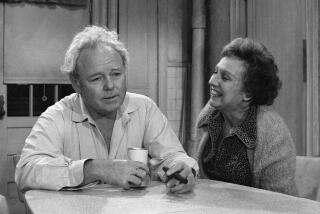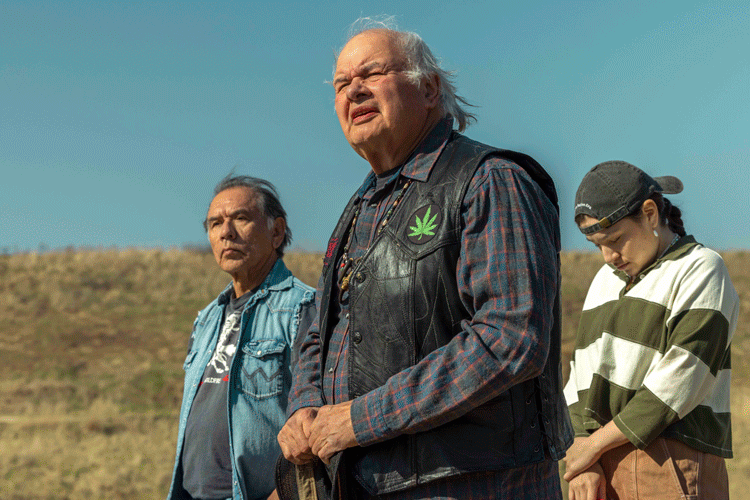THE BEEB, ANOTHER JEWEL IN THE CROWN
- Share via
Last week the Academy of Television Arts & Sciences and the International Council of the National Academy of Television Arts & Sciences threw a large, black-tie soiree amid the ghosts of pleasures past in the Cocoanut Grove to honor the 50th anniversary of BBC television.
It was one of a transatlantic series of commemorations, and the West Coast party coincided nicely with a visitation by BBC brass to buy, and sell, product. “We, who are about to buy, salute you ,” said the BBC’s director of programs Michael Grade, a nephew of Lord Lew Grade.
The BBC had started telecasting two hours a day on Nov. 2, 1936, to a relative handful of sets in and around London. The telecasts stopped abruptly on the outbreak of war in 1939, stopped right in the middle of a Mickey Mouse cartoon, as the speakers recalled the other night.
It is an item of (true) legend that when the BBC resumed broadcasting in 1946, it led off with the second half of the interrupted cartoon. There’ll always be an England, and a Mickey Mouse.
As Howard Rosenberg has reported in a recent series of dispatches from Britain, BBC News has been under fire, mostly from members of the ruling Conservative party, on grounds that the Beeb has an anti-Tory or left-wing bias.
In this there are echoes of the Nixon Administration’s push to emasculate public television as being a comparably unfriendly voice. The evidence is flimsy and dubious in Britain, as it was here, but the consequences of the pressure are dangerous there, as here.
Going back to its radio days, the British Broadcasting Corp. has operated under a royal charter, which means that it is both non-commercial and also non-governmental, overseen by a crown-appointed board. The BBC is supported by annual licensing fees levied on television sets, and its independence, its integrity and its resources have been the envy of broadcasters over all the world.
The BBC has sometimes been guilty of a bland high seriousness. Fred Allen joked that BBC radio started its day with a lecture on how to stuff a field mouse, and just built from there.
Yet under the leadership of its first full-blown chief executive, John C. W. Reith, later Lord Reith, the BBC founded orchestras, gave shelter to a generation of poets, novelists and composers (W. H. Auden, Dylan Thomas, Louis MacNeice, Benjamin Britten among them), set unsurpassed standards for original drama and for reliable and unslanted news still heard worldwide in a variety of tongues.
Anyone who has spent so little as a quick holiday in Britain has had to be amused by but also envious of its television, which operates on a kind of checks and balances system that the U. S. devised for its government but neglected to apply to radio and television.
When the first commercial channel, ITV, was launched in competition with the BBC, BBC lost 75% of its audience almost overnight. Curiosity--and even the commercials, sharply restrained in length and placement--captured the audience.
Temporarily. What has become evident is that competition has served the British public very well.
The presumption once was that all those good imports on public television here were from the BBC. It is no longer true, and some of the jewels, like “Jewel in the Crown,” have come from the commercial television companies.
But the BBC can be said to have set the pace and the standards, with the likes of “The Forsyte Saga,” “Tinker, Tailor, Soldier, Spy,” “Monty Python” and “Civilisation.”
Commercial television keeps the Beeb from retreating to its bland politeness as Auntie, while the BBC with its implicit charge to excellence keeps commercial television from reaching too avidly for the lowest and most exploitive common denominator.
In the ‘60s, under the director-generalship of Hugh Carleton Greene (Graham’s brother), who had begun in news and current events, the BBC made some bold strides into documentary news coverage, and into satire with “That Was the Week That Was” and some successor shows.
Today the BBC fights ITV to better than a draw. In one October week, the ratings indicated that the top BBC shows (episodes of a twice-weekly soap called “East-Enders”) drew about 22 million viewers. The top two ITV shows (episodes of an ancient soap set in a provincial city and called “Coronation Street”) had about 16 million viewers. The other two channels, BBC2 and Channel 4, the second commercial channel, had 6 million viewers each for their most popular shows (which that week were a magic special on BBC2 and yet another twice-weekly soap called “Brookside” on Channel 4).
There are nothing like the choices available on American television, or the viewing hours. The two breakfast-time shows draw about 3.5 million viewers between them, and seek to outdo each other in coziness, everyone lounging about on sofas, the gents all in pullovers or sports shirts (and somehow looking supremely unnatural, like mannequins). Morning television has not yet become a national ritual.
There is talk of around-the-clock broadcasting, but when I lived there in the early ‘60s it was a prayer and “God Save the Queen” just past 11 p.m., and when I looked in again in August, the engineers appeared to be staying up no more than an hour later than they used to.
Weekday daytime television after the two morning shows is test patterns and Open University--lectures of boggling complexity on analytical chemistry and the higher mathematics, a kind of Sesame Street for Mensa members, and a valuable use of television in a country with a severe shortage of university places.
Like public radio and television in the United States, the BBC is in a cost squeeze, which can be more deadening than political pressure--and which can indeed be the form political pressure takes. But television is something Britain got right in an era when much else has gone wrong there. Those of us who look to the BBC with envy and admiration have to hope the politicians aren’t shortsighted enough to try to unright it.
More to Read
The complete guide to home viewing
Get Screen Gab for everything about the TV shows and streaming movies everyone’s talking about.
You may occasionally receive promotional content from the Los Angeles Times.






